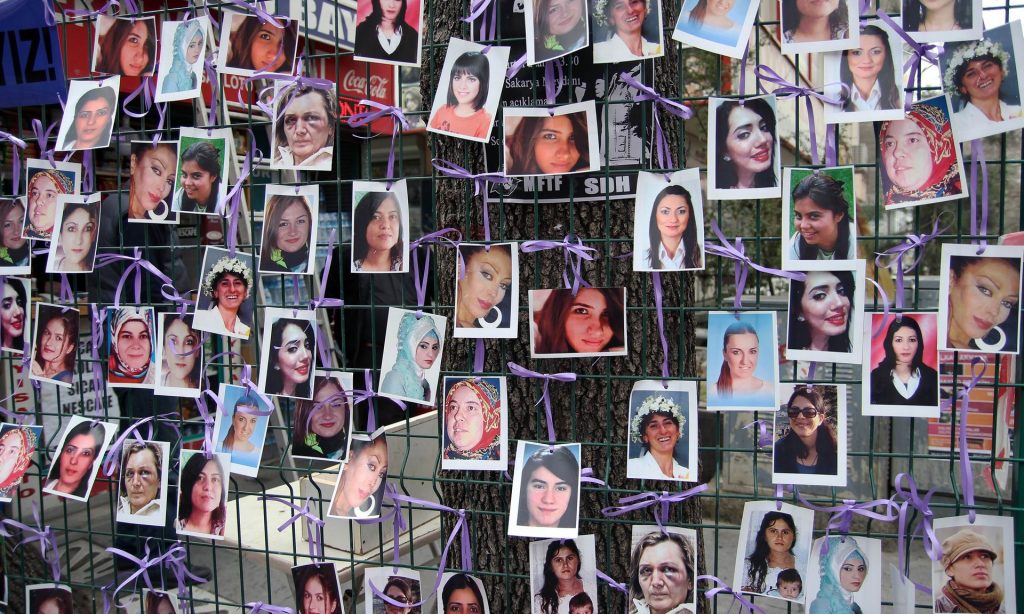
Photograph: Adem Altan/AFP/Getty Images
Women’s rights groups, lawyers and doctors have condemned Turkey’s decision to introduce a mandatory chemical castration programme for convicted sex offenders, arguing the treatment does not address the underlying reasons for widespread violence against women, and that bodily punishment will instead lead to increased abuse.
Özgül Kaptan, director of the Women’s Solidarity Foundation (Kadav), has condemned the law – which came into effect on 26 July, at a time of extended legislative powers – as misguided.
“It’s a very bad and dangerous decision,” she said. “The law reduces crimes related to sexual abuse and rape to the one offending individual and to that individual’s body, which disregards the systemic problem of why so many men in Turkey commit these crimes or are violent against women.
“Men are taught to think that they have a right over women. We need to change ideas about gender equality and masculinity. What we really need is a change of attitude, of education. That cannot be done by passing such a law, or overnight.”
Reliable data on violence against women in Turkey is hard to come by, and many cases go entirely unreported. According to the independent Turkish press organisation Bianet, 284 women were killed in Turkey in 2015. In 77% of cases, the murderer was the victim’s husband or partner, or a male relative. At least 133 women were raped, and 42% of the victims were under the age of 18.
“Crimes related to sex offending have much more to do with power and domination than with sex and the sexual drive of the offender. And there are many different ways of physical and psychological abuse,” Kaptan said.
Chemical castration involves the administration of libido-reducing drugs and, unlike physical castration, the effects are reversible. However, health experts have pointed out that the long-term use of some drugs used in chemical castration may lead to serious and permanent side-effects, including an increased risk of cardiovascular disease and osteoporosis.
Turkey joins a small group of countries that have legalised the punishment, including most recently Indonesia, as well as Poland, Russia and some states in the US. Germany, France, Sweden and Denmark have introduced voluntary use of the measure. According to research from Scandinavia, reoffending rates have dropped from 40% to between zero and 5%.
However, the new Turkish law does not seek the consent of the offender. Instead, the decision to administer treatment will be made by a court. An offender risks greater punishment should he fail to continue the treatment.
Kaptan argued that mandatory chemical castration was an inhumane punishment comparable to the death penalty.
“Violence will create only more violence. In that sense it should be talked about in the same way as we talk about the death penalty,” she said. “We oppose all corporal punishment, because it violates the bodily integrity and the human rights of a person.”
The controversial move came during Turkey’s three-month state of emergency, which allows the government to bypass parliament and pass laws and regulations virtually unopposed. Regulations introduced during the state of emergency, imposed after the attempted coup of 15 July, cannot be appealed.
“The AKP [the ruling Justice and Development party] profited from the current chaos in the country following the coup attempt,” Kaptan said. “They seized the opportunity to introduce this law, which under normal circumstances would have been opposed very strongly.”
Mandatory drug treatment for sex offenders has been discussed before in Turkey. In 2011, female AKP deputies suggested chemical castration after a 17-year-old girl was murdered by her boyfriend. The discussion regained momentum in 2015 following the killing and attempted rape of Özgecan Aslan, a 20-year-old university student. Each time, the idea was harshly criticised and subsequently dropped.
“Chemical castration is a punishment that will merely assuage the victim’s immediate wish for revenge,” warned lawyer Canan Arın. “It will not address the underlying problems. Sexual abuse is not only committed because of a man’s genitals. Sexuality and male-female relationships in Turkey are not healthy.”
Referring to Turkish president Recep Tayyip Erdoğan’s 2014 comments that men and women could not be equal because such a notion would “go against the laws of nature”, Arın asked: “If the government propagates such views, how are things supposed to change for the better?”
Both Kaptan and Arın underlined that Turkey’s existing laws were sufficient to deal with violence against women. In 2012, after the government enacted new legislation to prevent domestic violence, Turkey became the first country to ratify a Council of Europe treaty on violence against women, and the AKP government has promised to intensify its fight against rape and sexual assault.
But so far, little has changed. Women’s rights groups point out that legal measures have repeatedly fallen short, and that convicted sex offenders and those guilty of abuse and violence against women still benefit from courts reducing sentences for “good behaviour”, encouraging the public to see their offences as trivial. Arın also said that women who flagged up potential offenders to the police often did not receive the necessary protection.
“It would be enough if the police and the courts would do their jobs properly,” the lawyer said. “The existing legislation would be enough to deal with offenders, but these laws are often simply not being applied.”
There have not yet been any convictions on the basis of the new regulation, but Kaptan feared that once it happens, women will again be the ones to suffer.
“We fear that the victims will be blamed as being responsible for such an “attempt” on masculinity. Instead of bringing a solution, this new law will only further increase violence against women.”

